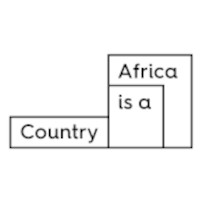How ‘Dawn’ magazine illustrates the significant role women played in South Africa’s armed struggle against apartheid.
From Dawn Vol. 8 No. 5, 1984 via Digital Innovation South Africa.
This post is part of the “Revolutionary Papers” series.
The soldiers of Umkhonto we Sizwe (MK) [the African National Congress’s military wing in the struggle against Apartheid] used publications as tools of mobilization, cultural expression, and political education. Produced through a printing press in MK camps, Dawn Magazine was a monthly journal that can arguably be read as a feminist text. Featured in the pages of a 1988 issue of Dawn, Beauty Khuzwayo’s poem “Advance” mobilizes women into fighting against Apartheid while simultaneously highlighting their role in the struggle for liberation. Khuzwayo’s poem evidences the notion that the courage to take up arms was not reliant on gender but instead, required the will to fight. This is echoed in the lines, “Don’t stop until we have completely eradicated this brutal monster/massive as it is, it’s also mortal/always bear that in mind!”
Khuzwayo’s anger and subsequent recognition of the mortality of Apartheid demonstrate the ways in which periodicals such as Dawn were useful in positioning women in the fight against racial, class, and gendered oppression. Describing Khuzwayo’s identity in the context of MK is arguably difficult as combatants usually wrote under noms de guerre. While some MK poets’ names have been resuscitated from Lindiwe Mabuza’s 2020 republication of the 1981 anthology Malibongwe, others, such as Khuzwayo, remain nameless and untraceable.
Umkhonto we Sizwe is historicized as a movement ridden with cases of sexual violence. In many ways, Dawn Magazine complicates this dominant view by showing women’s significant contribution in the liberation movement. At a politics of the armed struggle conference in 2016, the anti-Apartheid activist Thenjiwe Mtintso helped reshape our understanding of these women’s experiences by posing the following questions: “What was it like for a woman in MK? Were women treated as equals in all the structures? Were women set to be abused?” Mtintso posed these questions as a response to questions from a young woman in the audience who was of the view that the women of MK were victims of patriarchal abuse, and to the prevailing narrative of MK women as passive agents or victims of sexual abuse in South Africa’s liberation struggle. Dawn arguably promotes the necessity of an extended dialogue on Mtintso’s questions, and as a feminist text, can be read to counter this narrative by centering women’s voices in ways that underscore their autonomous roles in the anti-Apartheid movement.
Written by a community of combatants in Angola’s capital of Luanda, the periodical sought to inform combatants on revolutionary affairs, with women at the forefront of these conversations. First published in the 1960s and later revived in 1977, Dawn Magazine documented guerrilla attacks while also functioning as a tool of political education and disciplining (see for example Sam Longford’s Revolutionary Papers teaching tool unpacking the multiple functions of Dawn). In the pages of Dawn, comrades in the camps were notified of the events that took place in the lives of political women activists who were situated in South Africa and other countries. For example, an August/September 1982 issue that features the recently murdered Ruth First on its cover has a page that announces:
Winnie Mandela escaped death by inches when a booby trap in her car was discovered a few minutes before it went off. Added to the 17 years of banning orders. arbitrary detentions have become a permanent factor of Albertina Sisulu’s life; Jabu Nyaose and her husband Nyaose were callously and in a cowardly manner murdered when a heavy explosion ripped their car in Swaziland; and yesterday a parcel bomb put to an abrupt and untimely end the noble and heroic life of Ruth First.
Image via Digital Innovation South Africa.
Siphokazi Magadla’s recently published book Guerillas and Combative Mothers is key to understanding Dawn’s feminist discussions as it engages the participation of women and their combative roles in exile. Magadla’s observation of these autonomous roles sheds light on the kinds of training MK women received in Angolan camps, their subjectivities as soldiers and family women, as well as their sense of belonging in democratic South Africa.

Even though they comprised certain hierarchical structures that were necessitated by the intensity of armed conflict, the ANC and MK considered themselves “schools of equality.” We see this reflected in the journal, in a section titled “The Women’s Forum,” which covered issues relating to the plight of women. Furthermore, the centrality of “the woman question” in both the ANC and MK was evident in the journal’s commemoration of notable events, such as the celebration of Women’s Day, as well as the ANC’s declaration that 1984 was the “Year of Women.” For instance, the cover of one 1984 issue features two elderly Black women holding a banner that hosts the words of the famous song, wathinta abafazi, wathinta imbokodo (you strike a woman, you strike a rock).
The ANC and MK shaped the anti-colonial literary and cultural scene by including poetry written by women in the pages of Dawn. As a cultural weapon of struggle, the poetry featured in Dawn spotlighted the ways in which MK women combatants envisioned their role in the struggle as well as in the future South Africa. For instance, in a 1984 issue, Ilva McKay published her poem “Forget Not Our Mothers,” with an illustration by Judy Seidman. The poem explored themes of family, memory, longing, and the trope of jail.
In many ways, Dawn bridges the gap between the past and the present, marking the necessity of the archive in liberation politics. In the present, Dawn unfurls additional dialogue on the ways in which MK used periodicals as tools of mobilization and resistance. The historicization of Dawn arguably assists in unearthing interventions on contemporary feminist and political issues as some of the concerns raised by MK women remain prevalent today. For instance, Black women continue to face a triple oppression of race, class, and gender. The periodical facilitates a necessary inquiry into the process of social change through its coverage of political, militant, and cultural literacy, as well as resistance in the anti-Apartheid struggle.
Reading the archive of Dawn emphasizes the sentiments in Beauty Khuzwayo’s poem, which calls for militancy against all forms of oppression: “Don’t stop until we have completely eradicated this brutal monster/massive as it is.” Khuzwayo’s poem is relevant today as there remains an incessant need to tackle gender issues in ways that recover the legacies of MK women beyond narratives of victimhood and heroism. In rethinking the notions of gender and culture in the anti-Apartheid struggle, it is imperative to consider that as a publication, Dawn writes the autonomous roles of MK women into exile histories, while simultaneously highlighting their contributions in the fight against racial, gendered, and class oppression in South Africa.
FIRST PUBLISHED 10/10/2023 here






